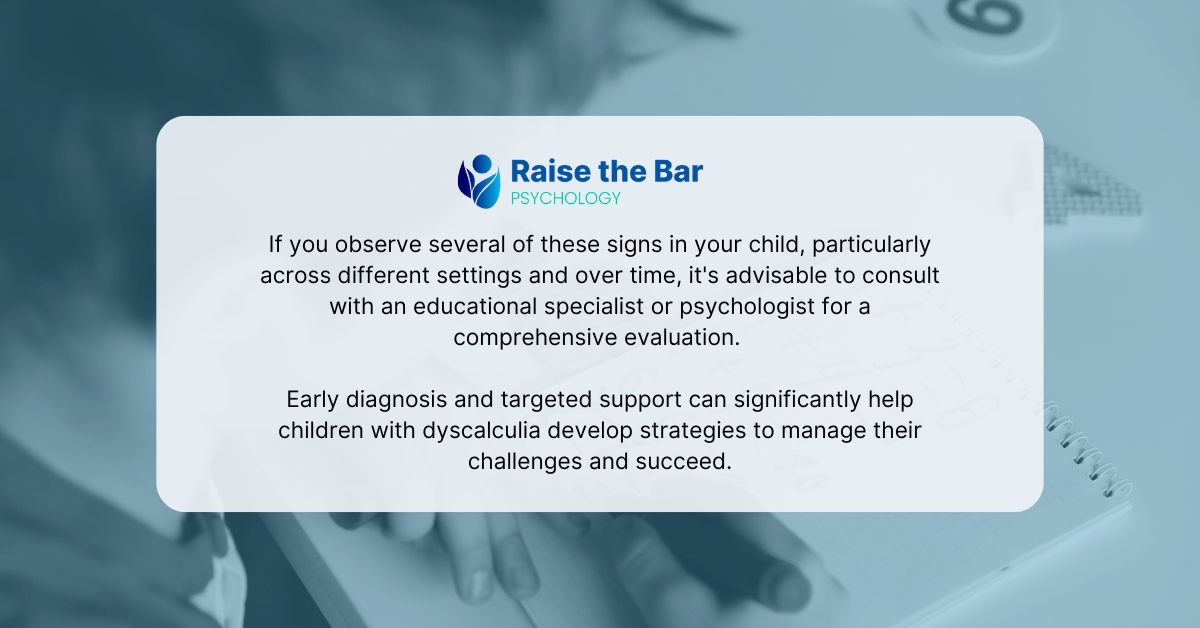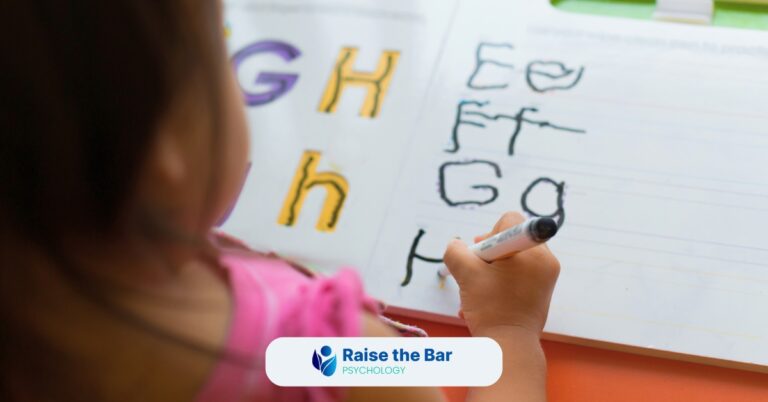Some children find math tricky—but when the struggle seems constant and unusually intense, it might signal something more.
Dyscalculia is a specific learning disorder that affects how the brain understands numbers and processes math, unlike simply disliking math or needing extra practice.
Recognising the signs early can make a significant difference. With the right support, children can develop strategies to manage challenges and regain confidence—not just in math, but across their learning.
If your child seems to be falling behind in math despite consistent effort, it’s worth taking a closer look. Understanding what’s going on is the first step towards helping them thrive.
What is dyscalculia?
Dyscalculia is a specific learning disorder that primarily affects a person’s ability to understand numbers and work with mathematical concepts. It’s often referred to as “math dyslexia,” though Dyscalculia and Dyslexia are distinct conditions.
Children with dyscalculia may rely heavily on counting on their fingers, confuse similar-looking numbers, or show extreme anxiety when faced with math-related tasks. These signs often go unnoticed or are mistaken for laziness or lack of effort.
Key characteristics of dyscalculia
-
Difficulty with number sense
- This means struggling to intuitively grasp quantities, understand the relationship between numbers, and recognise their values. For example, a person with dyscalculia might not instantly know that five is greater than three without counting.
-
Challenges with basic arithmetic
- This includes persistent difficulty with fundamental operations like addition, subtraction, multiplication, and division, as well as remembering basic math facts (like times tables).
-
Problems with mathematical reasoning and problem-solving
- Individuals with dyscalculia may find it hard to understand multi-step calculations, interpret word problems, or find different ways to solve math problems.
-
Difficulties with quantitative concepts
- This can extend to areas like estimating time, distance, and volume, reading analog clocks, managing money (e.g., making change, budgeting), and understanding graphs and charts.
Common signs of dyscalculia in children
-
Preschool (Ages 2-5)
- Difficulty with number sense: Struggling to understand quantities, compare amounts (e.g., recognising that “20” is larger than “12”), or estimate.
- Trouble counting: Difficulty counting in order, losing track when counting, or not being able to link numbers to sets of objects (e.g., understanding that “3” means three blocks).
- Challenges with patterns and sequencing: Difficulty sorting or matching by quantity or size, or remembering number-related songs or rhymes.
- Delayed understanding of number magnitude: Not grasping that “four” and “4” represent a collection of four things.
-
Primary school
- Persistent use of fingers for counting: Continuing to rely on finger counting for simple calculations long after peers have stopped.
- Poor memory for math facts: Struggling to memorise and recall basic addition, subtraction, multiplication, and division facts, even with practice.
- Difficulty with mental math: Taking a long time to perform calculations in their head or struggling with multi-step mental arithmetic.
- Challenges with time and money
- Difficulty telling time on an analog clock.
- Struggling to manage pocket money, make change, or understand the value of coins and bills.
- Trouble estimating time or distance.
- Spatial and directional difficulties
- Confusing left and right.
- Getting lost easily or struggling with directions.
- Difficulty reading maps or schedules.
- Problems with patterns and sequences (more complex)
- Failing to notice or extend numerical patterns (e.g., 5, 10, 15…).
- Not seeing connections like $3 + 4 = $7 and $30 + $40 = $70.
- Difficulty remembering sequences, such as phone numbers or post codes.
- Struggles with math vocabulary and symbols
- Confusing math symbols (+, -, x ) or not understanding their meanings.
- Misinterpreting terms like “more than,” “less,” or “difference.”
- Avoidance and anxiety
- Developing significant math anxiety, fear, or stress when faced with math tasks.
- Avoiding math-related games, activities, or homework.
- Reluctance to participate in tasks that involve numbers.
-
Secondary school (and beyond)
- Continued struggles with foundational concepts: Despite advanced coursework, still having difficulty with basic arithmetic, number sense, and recalling math facts.
- Real-world application challenges:
- Struggling with math in everyday contexts like budgeting and cooking (measurements).
- Difficulty interpreting graphs, charts, and measurements.
- Problems with understanding financial concepts (e.g., loans, interest).
- Limited problem-solving flexibility: Difficulty transferring skills to new contexts or understanding why a particular math strategy works.
- Difficulty with abstract math concepts: Struggling with algebra, geometry, and higher-level math.
- Time management issues: Persistent lateness or difficulty estimating how long tasks will take.
- Memory challenges: Trouble remembering important numerical information, like phone numbers, addresses, or historical timelines.
- Difficulties with games: Struggling to keep score in sports or board games, or understanding game rules that involve numbers.

Final thoughts
If you observe several of these signs in your child, particularly across different settings and over time, it’s advisable to consult with an educational specialist or psychologist for a comprehensive evaluation.
Early diagnosis and targeted support can significantly help children with dyscalculia develop strategies to manage their challenges and succeed.
Book an appointment with one of our experienced psychologists today to discuss your needs and whether our assessment and intervention services are appropriate for you.
Author
-

Dr Kate Jacobs
Director / Educational and Developmental PsychologistDr Kate Jacobs completed a combined PhD/Masters in Educational and Developmental Psychology at Monash University in 2013. She was awarded the Mollie Holman Doctoral Medal for the best PhD thesis in the Education Faculty for the year.




